The Innovation Lab for Nutrition and USAID Advancing Nutrition organised a webinar series to hear about the project's research, results, and learning to inform future programming.
Designed to inform and engage stakeholders, this series covers research conducted by the Innovation Lab for Nutrition and its stakeholders over the past ten years. During each webinar, panelists present findings from their research, discuss policy implications of these findings, discuss what needs to be done to better link research to practice, and identify research gaps for future consideration.
5 August 2020. Animal Source Foods (ASFs) and Child Nutrition in Bangladesh, Nepal and Uganda
Animal sourced foods (ASFs) are nutrient dense foods that when consumed in small amounts provide quality protein, vitamins, minerals and amino acids, and all nutrients critical for growth and development, particularly of infants and young children. While evidence supports the contribution of ASFs in improving the linear growth of children, a better understanding of the long-term effects of the consumption of different ASFs is needed.
Exposure to mycotoxins through the diet is widespread in many resource-constrained areas of the world. Additionally, research conducted by the Feed the Future Innovation Lab for Nutrition at Tufts University suggests that aflatoxins, in particular, may be associated with poor nutrition outcomes in infants and young children, beginning in utero. We invite you to join this upcoming webinar to learn more about findings from studies in Uganda, Mozambique, Nepal, and Timor-Leste and to discuss the necessary policy and programmatic actions required to improve food safety, limit exposure, and improve health.
Designed to inform and engage stakeholders, this series covers research conducted by the Innovation Lab for Nutrition and its stakeholders over the past ten years. During each webinar, panelists present findings from their research, discuss policy implications of these findings, discuss what needs to be done to better link research to practice, and identify research gaps for future consideration.
17 June 2020. Aquaculture-Horticulture Linkages & Innovative Technologies in Bangladesh
In Bangladesh, the Feed the Future Innovation Lab for Nutrition's focus is on aquaculture programming, linked in various ways to horticulture promotion, innovations in drying and storage of products, and behavior change communication. Located in the Feed the Future zone of Bangladesh (the South-West), NIL works closely with local academic institutions, international partners (such as IFPRI), and implementing organizations (such as SPRING) to generate strong empirical evidence of how food choices are made, how diets change, and what impacts are possible on nutrition.
This webinar covers NIL's research, findings, and innovative technologies in the realm of aquaculture and horticulture in Bangladesh. Speakers explain how their efforts contribute to a shared research agenda that ultimately informs policy and programming within the context of USAID and globally.15 July 2020. Markets and Infrastructure: The Roles of Market Access in Shaping Diets in Bangladesh, Uganda, and Nepal
Many factors combine to shape diets and maternal and child health. In this webinar co-hosted by USAID Advancing Nutrition and the Feed the Future Innovation Lab for Nutrition, we review recent research from the Feed the Future Innovation Lab for Nutrition regarding the role of markets and infrastructure in mitigating nutritional risks. We focus specific attention on findings from Bangladesh, Nepal and Uganda, examining correlates and drivers of dietary diversity, linear growth and weight gain, and nutritional resilience.
In Bangladesh, the Feed the Future Innovation Lab for Nutrition's focus is on aquaculture programming, linked in various ways to horticulture promotion, innovations in drying and storage of products, and behavior change communication. Located in the Feed the Future zone of Bangladesh (the South-West), NIL works closely with local academic institutions, international partners (such as IFPRI), and implementing organizations (such as SPRING) to generate strong empirical evidence of how food choices are made, how diets change, and what impacts are possible on nutrition.
This webinar covers NIL's research, findings, and innovative technologies in the realm of aquaculture and horticulture in Bangladesh. Speakers explain how their efforts contribute to a shared research agenda that ultimately informs policy and programming within the context of USAID and globally.15 July 2020. Markets and Infrastructure: The Roles of Market Access in Shaping Diets in Bangladesh, Uganda, and Nepal
Many factors combine to shape diets and maternal and child health. In this webinar co-hosted by USAID Advancing Nutrition and the Feed the Future Innovation Lab for Nutrition, we review recent research from the Feed the Future Innovation Lab for Nutrition regarding the role of markets and infrastructure in mitigating nutritional risks. We focus specific attention on findings from Bangladesh, Nepal and Uganda, examining correlates and drivers of dietary diversity, linear growth and weight gain, and nutritional resilience.
5 August 2020. Animal Source Foods (ASFs) and Child Nutrition in Bangladesh, Nepal and Uganda
Animal sourced foods (ASFs) are nutrient dense foods that when consumed in small amounts provide quality protein, vitamins, minerals and amino acids, and all nutrients critical for growth and development, particularly of infants and young children. While evidence supports the contribution of ASFs in improving the linear growth of children, a better understanding of the long-term effects of the consumption of different ASFs is needed.
This webinar examined the role of ASFs in improving the nutritional status of vulnerable populations and present findings from the Innovation Lab for Nutrition’s studies in Nepal, Uganda and Bangladesh. These include econometric multi-country analyses assessing the role of the type of ASF and the total number of ASFs in supporting optimal growth and development. We will also present analyses and findings on our work in the realm of nutrition-sensitive interventions (e.g. aquaculture and animal husbandry), consumption of ASFs, and nutritional status.
12 August 2020. Aflatoxins and Maternal and Child Nutrition: Findings from Nepal, Mozambique, Uganda, and Timor-Leste
19 August 2020. Webinar on, "Environmental Enteric Dysfunction, WASH, and Nutritional Status of Women, Infants, and Young Children: Findings from Uganda, Sierra Leone, and Nepal. Organised by the Innovation Lab for Nutrition/Feed the Future co-hosted with USAID Advancing Nutrition. all webinar recordings can be found on the website.
Environmental enteric dysfunction (EED) is a dynamic condition characterized by reduced nutrient absorption, increased gut permeability, and inflammation.
- It is associated with poor environmental hygiene and contamination, poor water quality, poor hygiene and sanitation practices, and an altered microbiota. EED has been implicated in increasing the risk of stunting and wasting in early life and the risk of a poor birth prognosis in pregnancy. However the evidence on both its causes and effects has been mixed.
- This may be in part due to measurement challenges as the gold standard metric of EED, the lactulose-mannitol test, measures only part of the EED process.
- Research supported by the Feed the Future Innovation Lab for Nutrition in Uganda, Sierra Leone, and Nepal aimed to test new metrics for EED assessment, examine the relationship of EED, stunting and wasting within the context of poor WASH practices, an altered microbiota, and the presence of contaminants such as mycotoxins.
- Dr. Shibani Ghosh - Research Associate Professor at Friedman School of Nutrition Science and Policy
- Dr. Jaqueline Lauer - Public health nutritionist and Clinical Assistant Professor at Boston University
- Dr. Akriti Singh - In August, Dr. Singh successfully completed her thesis defense to receive her PhD from Tufts University, Friedman School of Nutrition Science and Policy
- Dr. Christopher Duggan - Pediatric gastroenterologist and nutrition physician at Boston Children's Hospital, Professor of Pediatrics at Harvard Medical School, and Professor at the Harvard TH Chan School of Public Health

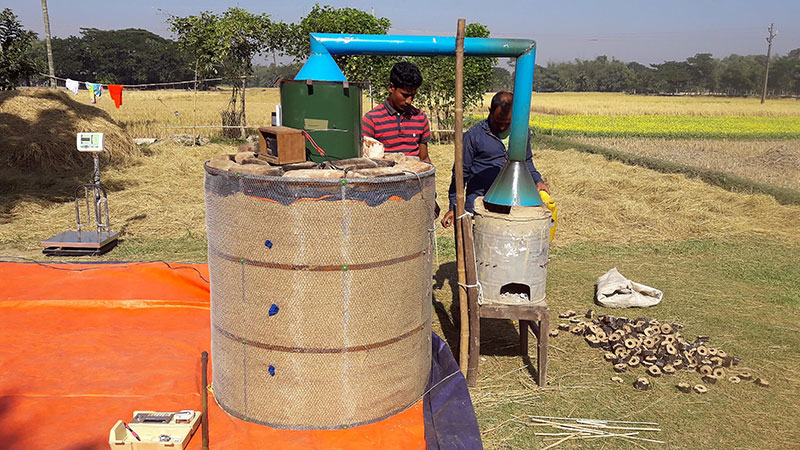
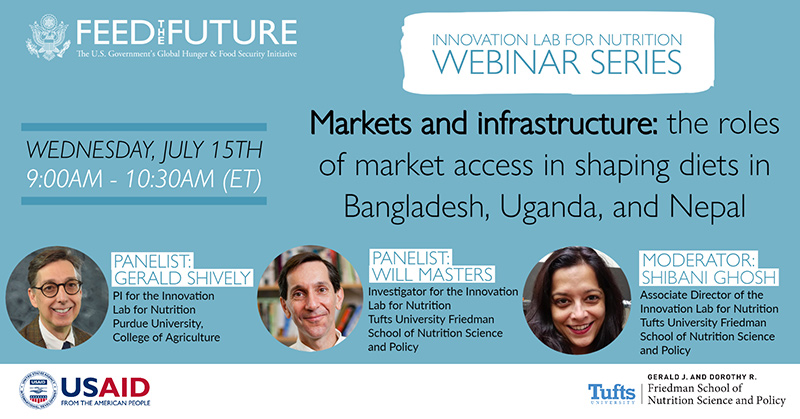
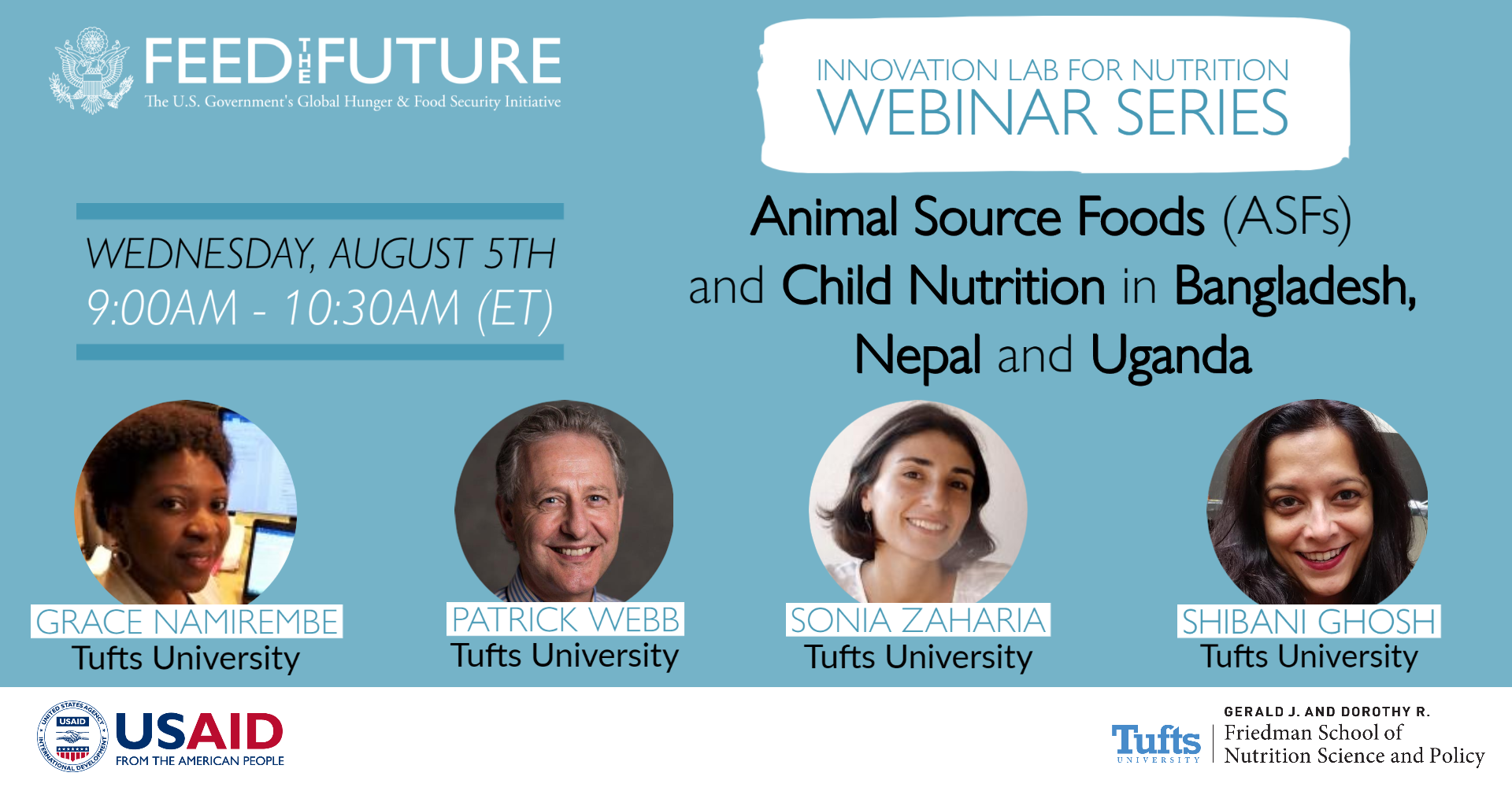
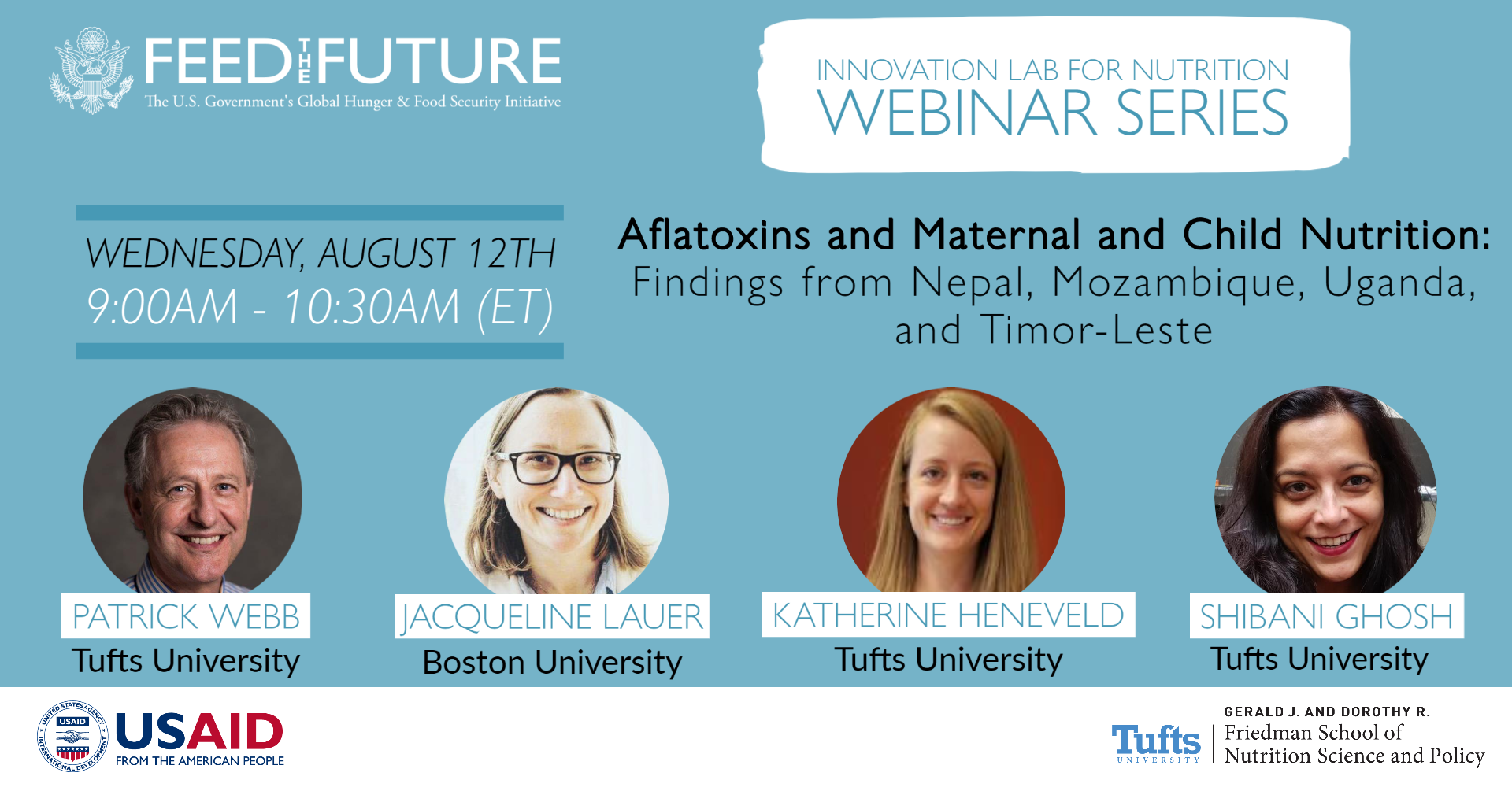
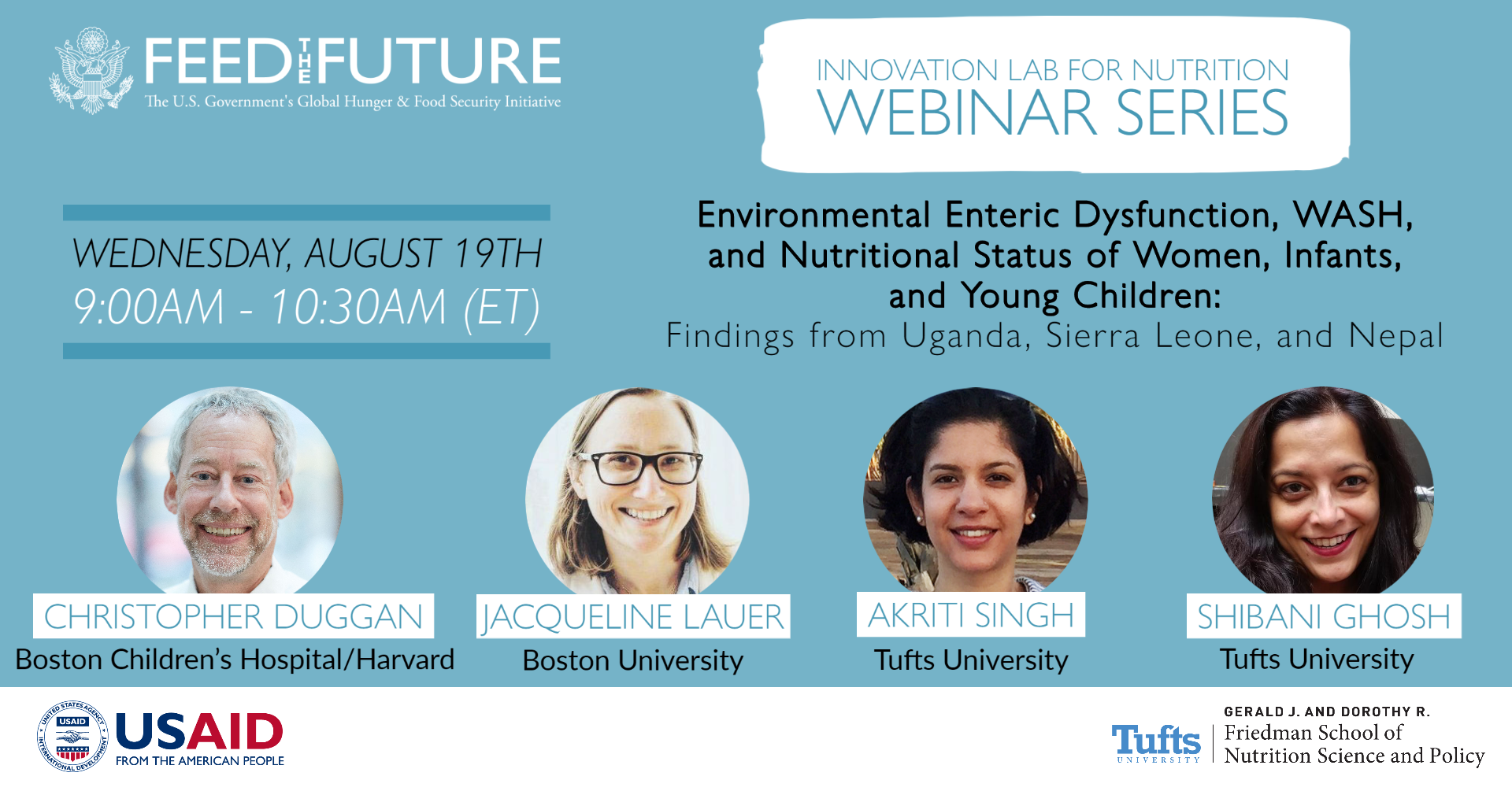
No comments:
Post a Comment